


Department of Social Services
Easy English

Some words in this book are blue.
We write what the blue words mean.

You can get someone to help you
understand this book
find more information.

Contact information is at the end of this book.

This book is from the Department of Social Services.

We are part of the Australian public service.
We call ourselves the department.
This book is about the National Disability Insurance Scheme or NDIS.

The NDIS gives services and support to people with permanent disability.

Permanent disability means a disability that will not go away.
The NDIS also gives services and support to people who need early intervention

Early intervention means we work with some people now so they need less support later.

Early intervention can be for
children

adults
people with psychosocial
disability.

Psychosocial disability means a mental illness that causes disability.
This book says how we want to change the NDIS

We asked someone from outside the department to review the NDIS.

A review is when we check
what is good about the NDIS
what is not good about the NDIS

how we can make the NDIS better.

Our review gave us ideas about how we can
make the NDIS better for people with disability

make sure the NDIS has enough money to last a long time.

We asked the Australian parliament to make a new law about the NDIS.

The parliament is a group of people that makes laws for Australians.
A law says
what is allowed

and
what is not allowed.

Our new law says we can make new rules about the NDIS.

We must tell parliament
if we asked people with disability to help make the new
rules

what people with disability say about the new rules.

Our new law has 3 parts.

Access is when you can be part of something.

Our new law says we will tell you why you are part of the NDIS.

You might be part of the NDIS
because of your permanent disability

because you need early intervention

because of your permanent disability and you
need early intervention.

We will give people with permanent disability an impairment notice.
An impairment notice says what disabilities let you be a part of the NDIS.

We will check if people who get early intervention still need it.

We might decide that someone
still needs early intervention

does not need early intervention but still needs
to be in the NDIS

does not need early intervention and does
not need to be in the NDIS.

We will make new rules for how we test functional capacity.

Functional capacity means what a person with disability
can do

needs support to do.

NDIS budget means how much NDIS money you have.

We will make new rules for how we do a needs assessment.

A needs assessment is when we find out what support a person with disability needs.
We will test if someone
needs support from the NDIS

needs support from other services
for example, a doctor

needs support for something that makes it harder to live with their disability
for example, an illness.

Your NDIS plan says
how much NDIS money you have for the supports you need

and
what NDIS supports you can spend your NDIS money on.

We call it your total funding amount.
Your total funding amount depends on
what NDIS supports you need

how much your NDIS supports cost.

There are 3 kinds of NDIS supports.

Core supports means things you need every day.

Capital supports means things you need to use, like a communication board.

Capacity building means supports that help you do more things for yourself.

You will get NDIS money for each kind of support that you need.

Your NDIS plan will say how much NDIS money you can spend on each kind of support.
We call this your funding component amount.
How long your NDIS money lasts for is called your funding period.

Your NDIS plan might have
1 funding period that goes for 1 year

or
lots of funding periods that go for less than 1 year.

For example, a 1 year NDIS plan might have two funding periods that go for half a year each.

Framework means how we decide how much money should be in your NDIS budget.
We will find out how much NDIS money you should get by
looking at your impairment notice

looking at your needs assessment.
We will make new rules about NDIS supports.

NDIS supports means services you get from the NDIS, like a support worker.

The new rules will say what you
are allowed to spend your NDIS money on

and
are not allowed to spend your NDIS money
on.

We will have new rules for when you do not have to pay an NDIS debt.
You might get an NDIS debt if you spend NDIS money on something that is not allowed.

Sometimes we might tell you what you must spend some of your NDIS money on to
keep you safe

make sure you do not run out of money.
Our new law makes rules for how an NDIS claim must be made.
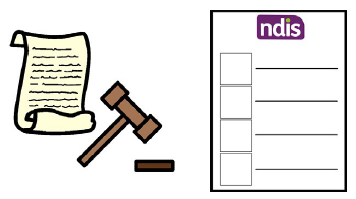
Claim means you ask for NDIS money for a service or support.
The rules say a claim must
be made by the person who manages your NDIS budget

be made on the right form
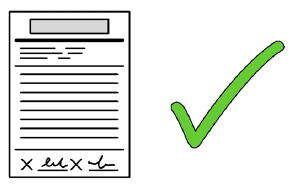
have all the right information.

The National Disability Insurance Agency will work with people with disability to
make sure they understand the rules for NDIS claims

make sure the rules for NDIS claims meet their needs.
The National Disability Insurance Agency means the people who look after the NDIS.

We call it the agency.
Our new law says the agency can
look at how NDIS money is spent

change who manages your NDIS budget

find out if there is fraud in how NDIS
money is spent.

Fraud means someone hides the truth about how they spend NDIS money.

We will make new rules for the NDIS Quality and Safeguards Commission.
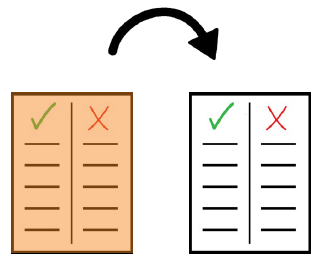
The NDIS Quality and Safeguards Commission makes sure
NDIS services are the best they can be
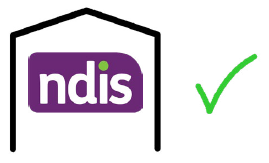
NDIS services are safe

people who give NDIS services do a good job.

We will make new rules about
who can give services in the NDIS

who cannot give services in the NDIS.

We will make the new rules after we ask people with disability what they want.

We will tell you when we want to ask people with disability about the new NDIS rules.
All the state and territory governments must agree to the new rules.

We will tell you when you need to follow the new rules.
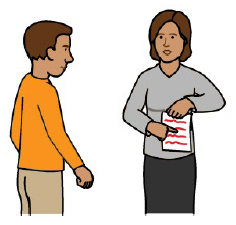

For more information contact the Department of Social Services.
Email enquiries@dss.gov.au

Call 1300 653 227

Website dss.gov.au/NDISreforms

Join our list to
get new information about our law
hear about consultations.
Website dss.gov.au/disability-and-carers

Use the free Translating and Interpreting Service or TIS to make a phone call.

You can call the TIS in your language.
Call 131 450

Give the TIS officer the phone number you want to call.
Use the National Relay Service to make a phone call.
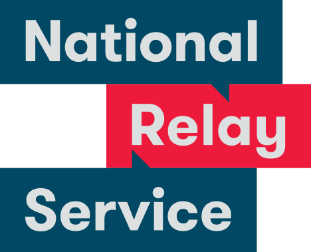
You must sign up to the service first.
Website accesshub.gov.au/nrs-helpdesk

Call 1800 555 660

This Easy English document was created by Scope (Aust) Ltd. in September 2024 using Picture Communication Symbols (PCS). PCS is a trademark of Tobii Dynavox, LLC. All rights reserved. Used with permission. This document must not be sold to third parties. The images must not be reused without permission. For more information about the images, contact Scope on 1300 472 673 or visit scopeaust.org.au
